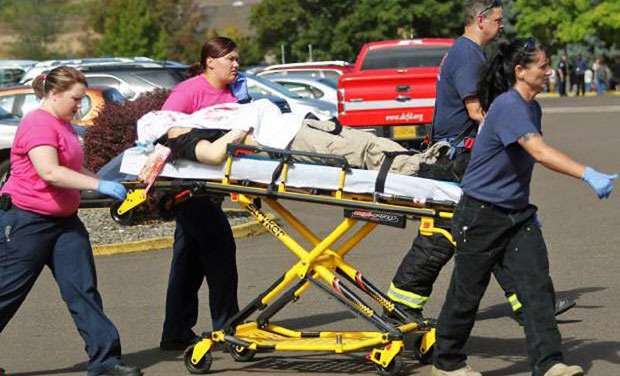Once again we are confronted with a horrific mass shooting on a college campus. Once again, we mourn the loss of promising lives, and out of chaos and confusion, in search of answers, our collective dialogue focuses on guns and mental illness. The gun lobby is too strong to allow any blame to land in their territory. Unfortunately, those suffering from mental illness have no lobbyist fighting for their cause.
Ignorantly, we add to the stigma, by putting the blame on those suffering from mental illness. We blame the problem on mental illness, not remembering that the scientific research clearly shows that those who carry a mental illness diagnosis, have a greater chance of being a victim, rather than a perpetrator of a crime. We ask for more psychiatric treatments, not realizing, that there are very reliable studies that question the side effects of psychiatric drugs and their relationships to violence. We are trying to medicate brokenness, loneliness, confusion, anger, hopelessness, and darkness. Indeed, Peter Breggin, a respected psychiatrist, who was a medical expert in the cases surrounding Eric Harris (the Columbine shooters) and James Holmes (the Aurora shooter), writes:
We are once again reminded of one conclusion that comes out of nearly every act of mass violence: Going through the mental health system often makes people feel more humiliated and angry, and commonly leads to psychiatric drugs which do more harm than good, causing or inflaming the aggression. Calls for more investment in the current mental health system are distracting and will increase the likelihood of more violent deaths.
Photo from deccanchronicle.com
You can read Breggin’s full article here.
It is not politically correct to bring up evil. We no longer have an acceptable vocabulary for explaining the darkness in our inner lives and connecting it to the horrors we witness in our world. It is not politically correct to discuss the fallen humanity of us all, the power of sin, and the forces of evil that roar around us. We try to deny that many of our loved ones and our neighbors walk around keeping their life traumas bottled up and hidden in their soul, creating a fertile ground to be exploited by evil. It is easier to close our eyes to the damages we have done to each other than the hard work of repentance.
How can we accept that some hear the voices of evil with a greater intensity because of the sensitivity and brokenness of their souls? Accepting that fact leads to the conclusion that we are all vulnerable, at risk, and out of control to set our own destiny. But the culture tells us that that cannot be! The culture wants us to believe that most of us are fine people and the harrowing portrait of chaos we witness is because there are those insane, and evil creatures that need to be chained, physically or chemically. The truth is that we all have fallen short of the glory of God, and all are sinners in need of grace. Evil can happen by any of us!
Yes, there are people who are enslaved to persecuting voices, influencing them to act beyond reason. I know from personal experience, that my daughter hears voices telling her to rebel against us, and to prove her independence and might. The voices remind her of everything and everyone that have wronged her, and they entice her to show the community around her the consequences of their unkindness, insensitivity, and manipulation. The voices threaten her that there is no peace for her, except through submission and obedience to them. I have witnessed what it takes of her to fight these voices and resist them. She fights with all that she has left in her! If it were not for the grace of God, and the fact that she can still think and discern right and wrong without the influence of mind-numbing drugs, she would’ve been consumed by the torturous voices, who are there to claim her life and the life of her family.
Our mental health system is completely broken. Adding more investment and providing more of the same treatments that often hurt more than help, are not solutions to our cultural brokenness. Andrew Scull, the renowned psychiatric historian, writes about the significance of non-biological factors in transforming the neural structures of one’s brain. He stresses, “The very shape of the brain, the neural connections that develop and that constitute the physical underpinnings of our emotions and cognition, are profoundly influenced by social stimulation, and by the cultural and especially the familial environment within which these developments take place.”[1] We cannot address someone’s tormented mind in vacuum, isolated from their social and familial context. Scull refers to a candid admission made by Thomas Insel, the former director of National Institute of Mental Health (NIMH): “His psychiatric colleagues, he said dismissively, ‘actually believe [that the diseases they diagnose using the DSM] are real. But there’s no reality. These are just constructs. There is no reality to schizophrenia or depression … we might have to stop using terms like depression and schizophrenia, because they are getting in our way, confusing things.’”[2]
Our fallen humanity is in need of God’s grace through the body of Christ. If you see one hurting around you, give them a hug, go for a walk with them, give them genuine attention, connect them to your church, and show them the sacrificial love of Christ. Welcome them into your life as if you are welcoming the wounded Christ. Though drugs may help at times, they are not meant to heal the inner wounds. Reach out for the wounded persons and families before they fall apart. If the church does not rise up to this challenge, who will?
[1] Andrew Scull, Madness in Civilization: A Cultural History of Insanity from the Bible to Freud, from the Madhouse to Modern Medicine (Princeton and Oxford: Princeton University Press, 2015), 410
[2] Ibid, 408

Leave a Reply